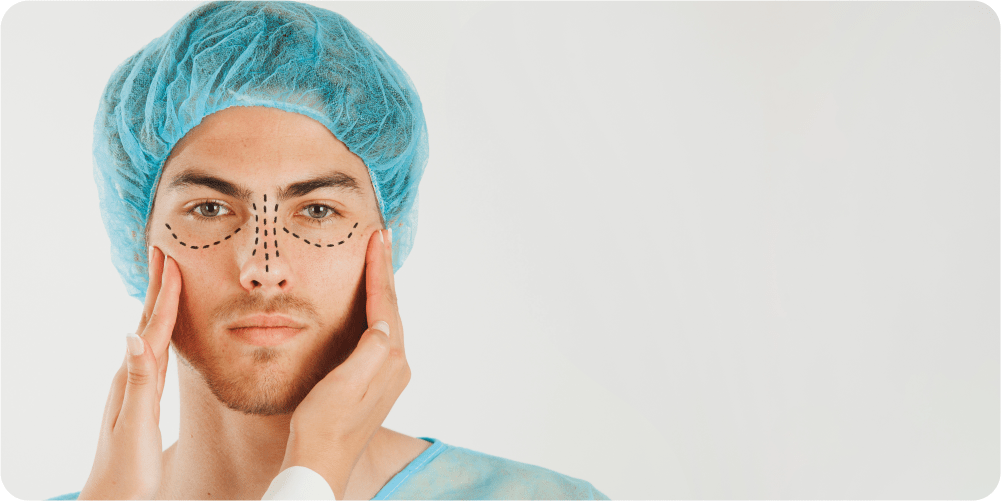
Reconstructive Surgery
Reconstructive surgery corrects birth defects, diseases-related defects, and injury-related deformities. You might require hand surgery to treat congenitally webbed fingers or a breast reconstruction following a mastectomy, for instance. Any area of your body that has been damaged by any of these problems can be repaired through reconstructive surgery. Because it is performed for medical reasons, reconstructive surgery is distinct from cosmetic surgery. Reconstructing something after it has been destroyed or damaged is what the word “reconstructive” denotes.
What Kinds of Reconstructive Surgery Are There?
There is a method that can help with every condition, no matter how many injuries, birth deformities, or disfigurement concerns happen in our imperfect life. These consist of:
- Breast reduction or reconstruction These operations can be performed on males as well as on women who have had mastectomy surgery or whose unusually large breasts are causing back pain or other related health issues.
- Operations on the hands and feet. Any number of diseases, including webbed or additional toes or fingers, non-cancerous and malignant tumours, and other conditions can be treated with this procedure. Carpal tunnel syndrome can also be treated for individuals.
- Wound healing. Skin grafts or other reconstructive procedures are offered for people who have suffered serious burns or cuts.
- Flap techniques or microsurgery. These operations can be used to replace bodily parts that have been damaged or diseased, such as cancer, in some cases.
- Facial plastic surgery. These can be used to treat chronic illnesses including sinus infections, respiratory issues like snoring, and face abnormalities like cleft lips.
Additional procedures consist of:
- Correction of cleft lip and palate
- Surgery for craniosynostosis (head reshaping)
- Operations for gender confirmation (transfeminine/transmasculine)
- Treatment for lymphedema
- Headache surgery (chronic headache relief)
- Panniculectomy (body contouring)
- Septoplasty (deviated septum correction)
Reconstructive Surgery
Reconstructive surgery corrects birth defects, diseases-related defects, and injury-related deformities. You might require hand surgery to treat congenitally webbed fingers or a breast reconstruction following a mastectomy, for instance. Any area of your body that has been damaged by any of these problems can be repaired through reconstructive surgery. Because it is performed for medical reasons, reconstructive surgery is distinct from cosmetic surgery. Reconstructing something after it has been destroyed or damaged is what the word “reconstructive” denotes.
What Kinds of Reconstructive Surgery Are There?
There is a method that can help with every condition, no matter how many injuries, birth deformities, or disfigurement concerns happen in our imperfect life. These consist of:
- Breast reduction or reconstruction These operations can be performed on males as well as on women who have had mastectomy surgery or whose unusually large breasts are causing back pain or other related health issues.
- Operations on the hands and feet. Any number of diseases, including webbed or additional toes or fingers, non-cancerous and malignant tumours, and other conditions can be treated with this procedure. Carpal tunnel syndrome can also be treated for individuals.
- Wound healing. Skin grafts or other reconstructive procedures are offered for people who have suffered serious burns or cuts.
- Flap techniques or microsurgery. These operations can be used to replace bodily parts that have been damaged or diseased, such as cancer, in some cases.
- Facial plastic surgery. These can be used to treat chronic illnesses including sinus infections, respiratory issues like snoring, and face abnormalities like cleft lips.
Additional procedures consist of:
- Correction of cleft lip and palate
- Surgery for craniosynostosis (head reshaping)
- Operations for gender confirmation (transfeminine/transmasculine)
- Treatment for lymphedema
- Headache surgery (chronic headache relief)
- Panniculectomy (body contouring)
- Septoplasty (deviated septum correction)
This list only represents a small portion of the procedures. All types of trauma, malignancies, and issues brought on by infections are covered by reconstructive surgery.
Potential side effects of reconstructive plastic surgery
Surgery of any kind involves some risk. People vary in terms of their physiology and capacity for healing. Depending on the procedure you have and your general health, there may be a number of risks and consequences with reconstructive plastic surgery, such as:
- Infection
- A lot of blood
- Bruising
- Difficulty in mending wounds
- Issues with anaesthesia
- Surgical issues
The likelihood of problems may rise if you:
- Smoke
- Possess damaged connective tissue
- Have radiation therapy-related skin damage
- Have diminished blood flow at the surgical site
- HIV-positive Have a weakened immune system
- Have poor dietary habits
Depending on your particular medical condition, there can be additional dangers. Prior to the treatment, make sure to share any worries you may have with your healthcare professional.
How Will the Doctor Assess Your Situation?
The particular circumstances of each person will be assessed on an individual basis. Your surgeon will obtain a thorough medical history and assess your case in light of the outcomes you seek and the clinical necessity. Do you have a traumatic burn that has affected your mobility and the underlying muscles? Have you experienced cancer and need to have several body parts surgically repaired? Your surgeon will assess the seriousness of your condition and counsel you on your alternatives. You and your partner can determine together which surgical treatment best meets your requirements and expectations.
Do you, for instance, suffer a severe burn that impairs your movement by affecting the underlying muscles? Have you experienced cancer and need to have several body parts surgically repaired? Your surgeon will assist you in weighing all of your alternatives so that you may jointly determine which one is ideal for you.
Will Reconstructive Surgery Be Covered by Insurance?
Contrary to elective aesthetic surgeries, most insurance companies will pay for reconstructive surgery, particularly if you have a functional issue. To be safe, make sure to ask your surgeon to document your case in writing and with images.
When should I get in touch with my doctor?
If you have had breast reconstruction, get in touch with your doctor right once if you experience any of the following signs:
- new skin modifications
- Swelling
- Lumps
- Pain
- liquid dripping
You should be aware of the specific symptoms associated with other reconstructive procedures. If you experience any additional symptoms that worry you, don’t wait to contact your healthcare specialists.
Don’t overlook how reconstructive surgery will affect your mental and emotional health. Surgery is demanding, the healing process requires time, and getting used to your new body and appearance can be challenging. For counselling, get in touch with Epicure. We have it all covered for you in the safest ways.
FAQs
Every year, around a million reconstructive surgical procedures are carried out.
Reconstructive plastic surgery is typically performed on two groups of patients, including:
You might need many operations carried out in phases.
Depending on your situation, a number of plastic surgery procedures may be either reconstructive or cosmetic. For instance, eyelid surgery (also known as blepharoplasty) may be performed for both cosmetic reasons and to repair eyelids that are badly sagging and obstructing vision.
Make careful to discuss the effectiveness of the operation with your surgeon before undergoing any form of reconstructive surgery. Expecting something and then not getting it is not what you desire.



